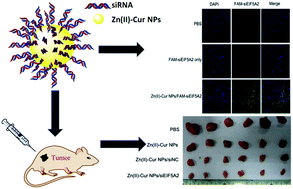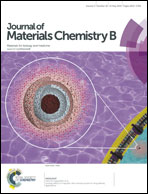Bifunctional pH-sensitive Zn(ii)–curcumin nanoparticles/siRNA effectively inhibit growth of human bladder cancer cells in vitro and in vivo†
Abstract
To overcome drug resistance, the combination of two or more therapeutic strategies with different mechanisms has received much attention in recent years. In this study, a common approach has been used to process curcumin and Zn2+ into colloidal dispersions known as “nanoparticles”, which are cheap and easy to prepare with high reproducibility. This novel vehicle has good biocompatibility and high cellular uptake for simultaneously delivering the curcumin drug and siRNA into tumor cells. Complexation of Zn2+ with curcumin enhances the aqueous solubility of the hydrophobic drug curcumin and further improves the cellular uptake and bioavailability. The acid-labile coordination Zn(II)–O bond in Zn(II)–curcumin drug nanoparticles (Zn(II)–Cur NPs) can respond to tumor intracellular acidic pH environments to release curcumin, and promoting acid-triggered intracellular drug release. The positively charged Zn(II)–Cur NPs can efficiently deliver siRNA into human bladder cancer cells, protect siRNA against enzymatic degradation, and facilitate the escape of loaded siRNA from the endosome into the cytoplasm, which successfully downregulates the targeted EIF5A2 oncogene and consequently inhibits cancer cell growth in vitro and in vivo. Proliferation and migration of cancer cells are inhibited by silencing the expression of EIF5A2 and increasing the ratio of pro-apoptotic BAX to anti-apoptotic BCL-2. In vitro and in vivo experiments have demonstrated that bifunctional Zn(II)–Cur NPs/siEIF5A2 can combine chemotherapy with gene therapy to afford higher therapeutic efficacy than the individual therapeutic protocols.


 Please wait while we load your content...
Please wait while we load your content...